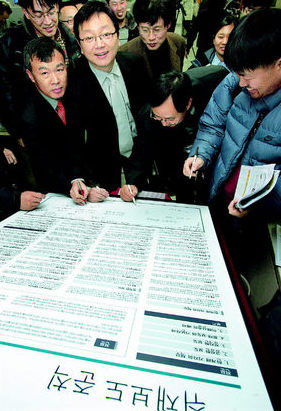 |
| ||||||
One of the biggest diseases plaguing Korean society today is that forums for public discussion recognized as valid are quickly disappearing. One of the biggest factors in this lies in the fact that the media - newspapers, in particular - are losing the public's confidence. Civil society's lack of trust in newspapers is so widespread that it is not a problem unique to any one class or group. No small number of people say they are afraid to open the paper every morning, or that there are articles or opinion pieces that can ruin one’s whole day after a single read. This reaction is leading to distain and contempt for those of us that work in print media. Being a member of the media does not carry anything close to the same trust and authority it used to; instead, stories and opinions are twisted because of partisan interests, and become targets of the public’s censure and pity. The current mistrust of newspapers does not stop at being a crisis for the industry; it is a vicious cycle that exacerbates the mistrust and discord in society as a whole.
As part of its effort to save its publication from the brink of crisis, The Hankyoreh Media Company has decided to implement and maintain a new set of guidelines for how its people cover the news. Our highest priority at the current juncture is restoring public confidence. We are going to begin by taking a painful look at how principles have been ignored and how misguided practices have brought mistrust upon us. Korea’s media companies have brought upon themselves this public malaise, through abrasive news collection practices, arbitrary story coverage and editing, unbalanced editorial positions, wrongful outside influence on editorial authority, self-righteousness that make them ignore readers' criticism, and by confusing the interests of the public and those that are their own. We confess that we at The Hankyoreh are by no means free from responsibility surrounding this crisis of confidence.
We began drafting these guidelines last year, after long and serious internal discussion and seeking the advice of scholars and experts. It has a total of 50 clauses. It was formally approved on January 29 in the name of all of us here at The Hankyoreh, with representatives from our share-owning readership. There are media outlets in Korea that have guidelines that are maintained internally, but The Hankyoreh is the first to let the world know about ours and call for open criticism. Since our founding in 1988 through voluntary donations following the June Democracy Struggle of the year before, The Hankyoreh has broken new ground in the media for establishing ethical guidelines, excluding the use of hanja (Chinese characters), printing the Korean script from left to right instead of from top to bottom, leaving no story untouched, and adopting the latest printing techniques. If our share-owing readers and civil society understand the significance of these guidelines and maintain a genuine interest in what we do, we will have a lighter burden in the course of improving the media climate and removing the malicious distortions that exist within it. We pray that our small effort will lead to a gradually greater movement, one that helps remove the country's media from blind antagonism and hate. We hope it will allow society to be just in sorting out its wrongs and become a vessel for suggesting solutions to the current discord.


No comments:
Post a Comment